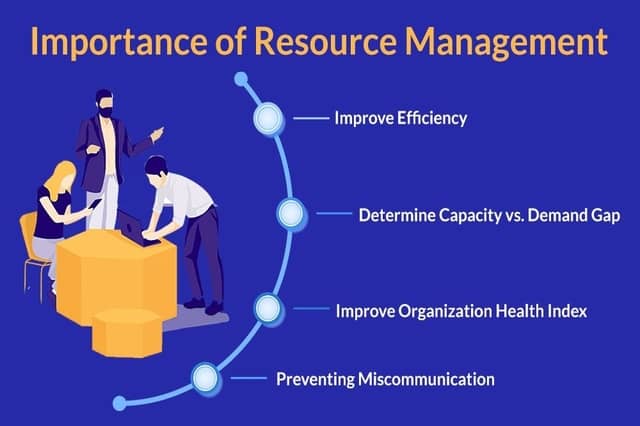Business Resource 101: A Detailed Management Guide for Businesses
Management is a part of our daily life. Whether we realize it or not, we are micromanaging small parts of our lives. However, when it comes to the business world, things become a lot more complicated. You are dealing with lots of different things, most of which you don’t understand.
Business resource management requires professional knowledge about how a business is run. When you have adequate knowledge about what your goals are, only then do you begin to work towards accomplishing them.
Organizations and businesses around the world spend a lot of time and money creating the right talent pool and acquiring the needed assets. All that time and money is going to go to waste if you can’t fully utilize every resource you have to the best of your abilities.
In this article, I am going to present a detailed guide regarding the role of resource management for business. By the end of this article, you will have adequate knowledge regarding the subject so that you can take the necessary steps to ensure seamless operations.
So, without further ado, let’s get right down to it.

What is Business Resource Management?
Business resource management is a process of planning, scheduling, and allocating various resources in an organization to achieve maximum efficiency.
Regardless of the kind of business you are running, you are going to depend on different assets to ensure the success of daily operations. If you are not reaping the full advantages of these resources, you are losing a lot of time and money.
With the help of resource management, a company can use its tangible and intangible assets in the right way and according to your current project.
For example, if you are trying to plan an event, it would not be wise to use your IT staff. Instead, you should let your marketing or creative thinking department achieve this task as it falls under their domain.
Moreover, resource management also helps you figure out if you have what it needs to do a certain task.
If you are working with a limited budget and you aim to run a digital marketing campaign, it is better to outsource these services to professional companies like Globex Outreach so that you can shift your focus to your main business and utilize your resources in the right way.
Here are some basic business resource concepts and components that you need to understand if you want to do it the right way.
-
Resource Scheduling
Resource scheduling is the first part of management that involves structuring each task based on the availability and capability of your assets.
The scheduling of tasks based on talent and disposal ensures that you are not putting too much burden on your employees or pushing them to their limits.
-
Resource Utilization
Every company in the world aims to get the best value for money. If they are hiring an employee, they want to use him to the best of their ability.
With the help of resource utilization, you can determine if you are extracting the true potential of a resource and how productive your assets are.
-
Resource Forecasting
It is a process of future-proofing your company by predicting the number of resources you are going to need as time goes on. It is mostly done by analyzing the tasks you are currently running and your immediate goals for the future.
Resource forecasting helps the managers plan out their hiring process and allocate resources the right way so that they don’t have to face any problems in the future.
-
Resource Capacity Planning
Resource capacity planning is used to determine the amount of work that can be done by existing employees and assets a company has.
It is a great way to do future resource allocation so that managers don’t agree to take up more projects that their team can actually handle.
-
Business Intelligence (BI) Reports
BI reporting is used to gain data insight so that better project decisions can be made within an organization and a company.
By collecting and analyzing data, a report regarding business performance is generated so that the current and past status of a company can be judged.
Importance of Resource Management
While resource management might seem like a time consuming or an extra task, it holds a lot of significance. Especially if you are running a large corporation, it often becomes difficult to manage all your assets and ensure that you are using everything to its full advantage.

The accuracy with which you use your resources is monumental in your success as you can keep up with tight project deadlines on top of maximizing the efficiency of each project. Here are some of the top reasons why resource management is necessary.
-
Minimize Costs
Resource management helps managers get valuable insight into a project and how much it is going to cost. By using this information, you can increase overall profitability and ensure that you are not using more than what’s needed on a project.
Moreover, if you don’t know how to allocate assets for your project properly and use more than what’s needed, you are going to face a shortage. Either you are going to have to acquire more resources or give up on future projects, both of which are going to hurt your revenue.
-
Improve Efficiency
A business resource plan helps develop the overall roadmap for a project, as you know the details every step of the way. You know which resources you have to use at which time and how to get the work done in the right way, which improves the overall efficiency of a project.
Most of the time, companies have lots of idle resources that are not being used. Resource managers can ensure that resources are used efficiently so that you get the best value out of the money you are paying to keep them.
-
Determine Capacity vs. Demand Gap
Determining capacity vs. demand gap is the process of finding out the number of resources you have against the demand of resources. It can be used to forecast shortages or excess of resources so that you can easily manage them and meet your requirements.
The shortage of resources happens when the demand is higher. And the excess of resources happens when demand is lower than your capacity. You can use this to stay ahead of the curve and make sure that you make the necessary changes.
-
Improve Organization Health Index
Organizational health index is determined by the ability of a certain index to sustain in a competitive environment and achieve improved performance over time. It is a great way to determine the performance of managers and leaders as to how accomplished they are at meeting goals.
When it comes to an organization, employees and staff look up to their leaders for motivation. With the help of resource management, you can increase employee-manager engagement, which is going to add more value to the organization.
-
Preventing Miscommunication
With proper resource management, everyone understands the tasks they have at hand. Managers are able to figure out if the resources are allocated in the right way. Having this kind of transparency prevents any miscommunication so that you don’t make any false promises.
As managers have an idea about their resources, they will only make promises that they can keep. It works very well in improving and increasing employee engagement so that everyone is on the same page about his tasks and there is no confusion.
6 Resource Management Skills Every Manager Should Have
Managers need to be an expert in the field and must possess some important skills to grow in the field and provide value. On top of having technical knowledge of their field, there are some other interpersonal skills that they need to develop; such as
-
Smooth Communication
The most important skill that a manager needs to develop is the ability to communicate with his team and build good relationships with them. If he can’t properly convey the details about a certain project, his team will never be able to achieve the tasks handed over to it.
Resource managers have to act as mediators between employers and employees. They need to be able to properly communicate what the higher-ups want and expect from the employees so that everyone in the team understands their responsibilities.
-
Conflict Resolution
Another important skill that managers need to exhibit is to solve problems without disturbing the operational efficiency within an organization. As an organization is handling several different projects at the same time, there might be a shortage of similar-skilled resources.
As a manager, you should be able to align your projects according to the resources you have so that no confusion is created. You must be equipped to handle any inter-department and intra-department conflicts so that everyone is on the same page.
-
Domain Knowledge
If a manager is working on a specific project, he must have specialized knowledge about the field. Having technical knowledge about the project is going to enable him to solve major and minor problems with ease and guide the team in the right direction.
As a team often looks up to the leader for inspiration, if a project manager doesn’t know anything about the project his team is working on, it is going to create a bad impression. By having first-hand knowledge about the project, a manager will be able to earn the trust of his team so that they follow him.
-
Proactive Planning
Unlike reactive management, where one waits for the problem to arrive, a resource manager must be able to think ahead in the future. Proactive planning emphasizes on identifying all the risks of a project and then creating a roadmap so that the chances of failure are reduced to a minimum.
The best way to be proactive in your approach is by prioritizing all the main tasks before anything else. As you are likely going to face more challenges while doing a hard task, you can check them off at the beginning of the project when everyone is motivated and then continue with easy tasks.
-
Strict Negotiation
Negotiation is an essential part of any project as it helps managers to scope out the project before it even begins. They need to exhibit excellent negotiation skills so that they can communicate with vendors, clients, and even their own team members and get the best out of the discussion.
The job of a resource manager is to provide value to the company he is working for. If he is unable to turn the tide into an organization’s advantage, he won’t be cherished. Before starting the negotiation progress, a manager must map out everything he needs and then make any commitments.
-
Risk Management
Last but not least, you have to remember that it doesn’t matter how much you plan for something, you are going to face some real-time problems. While you can’t control these things, but a manager needs to prepare for these this beforehand.
Whether it is a resource asking for a lot of leaves or some delays due to an unforeseen circumstance, you should be able to deal with these things. The better you are at tackling such issues, the more progress you can make.
Conclusion
Whether you are just a startup or a full-fledged corporation, resource management is an important part of any business. The current business market has become very competitive, which is forcing everyone to transform their business and improve their operations.
In times like these, you have to take advantage of every means possible and get the most out of your money. Resource management is all about getting more done with less, which is exactly what makes it so advantageous.
When you know how many resources you are working with and what you need to make a project successful, you need to understand and figure out how to utilize your resources. The job of a resource manager is to allocate resources the right way and do any project successfully.




